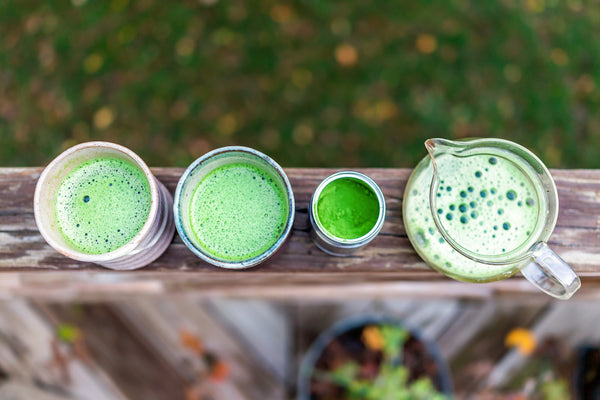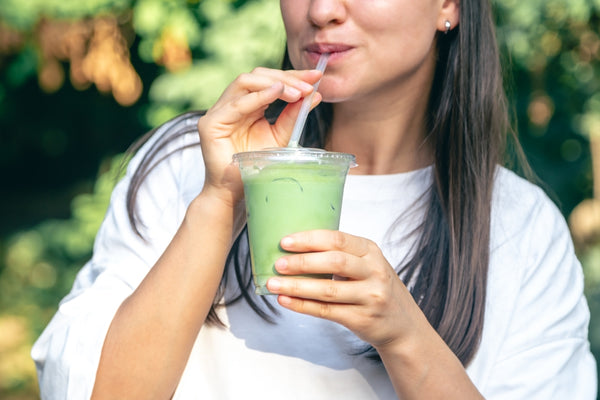Wondering what the most effective daily dose of matcha tea is to reap the long list of its studied health benefits? Keep reading to find out how much matcha green tea per day you should be having.
If you are an adult, we recommend enjoying 2-4 servings of matcha daily — multiple studies around matcha green tea powder have found this to be the healthiest serving of matcha on a daily basis.

When is the best time to drink your matcha tea powder?
When it comes to the best time for enjoying your matcha, morning and mid-afternoon are generally the best times to enjoy your matcha, though if you are drinking matcha for weight-loss you may want to consider having it about thirty minutes before your workout.
Learn about daily matcha green tea powder serving sizes, the ideal amount you should have to optimize your wellness, how quality comes into play, and more.
How much matcha you have a day depends on the quality of the matcha tea powder and personal taste
Matcha is safe to enjoy in ample amounts each day, but what function does quality play in expected health benefits? As it turns out, quality may be a significant determinant; certain qualities speak to dedicated health benefits.
It’s known that the range of qualities or “grades” of Matcha green tea powder actually have significant chemical differences, influencing the specific ways that your body’s health benefits from this tea.
The Matcha health benefits that interest you most may help you decide which matcha to choose and how much to drink each day.
- A 2018 study determined that of 67 samples of matcha powdered green tea tested outside of Japan, only one possessed prominent stress-reducing and blood pressure lowering properties due to the reduced amino acids of low-grade matcha tea powder [2].
- Our guide to the Differences between Matcha Grades can help explain this further. Here we’ll discuss how these details play into daily serving size.
Keep in mind that low-grade matcha green tea powder does come with other possible harmful side effects and risks, and experts recommend choosing a source of premium matcha that is rich in health-boosting compounds and heavily tested.
Is it good to drink matcha tea every day? How much matcha should I drink in a day?
Try and aim to have at least 2-4 grams or two to four servings of matcha green tea a day — so for example, 1–4 cups of tea per day.
Researchers have identified a minimum of 2g (2 servings) each day is needed to reap the full and long list of matcha health benefits, including its potent antioxidant properties.

According to multiple studies, following the standard serving size of one gram (1g) of matcha tea powder, your desired health benefits may become most pronounced when you drink between 2–4 servings of matcha green tea powder per day.
If you’re interested in the cognitive performance benefits of matcha, or the potential protections against neurodegeneration, take note of recent research stating that of 4 servings (4g) of matcha in one day.
- It was found that this dose improved the speed of attention and memory functions in the human test group compared to controls [4].
While you can drink matcha daily, remember it does contain caffeine, and the recommended daily limit for healthy adults is 400 mg per day. Poor quality matcha green tea powders may also have traces of chemicals and pesticides. It's also important to note some other compounds could be harmful in high quantities. It’s best to consume matcha green tea powder in moderation.
How much matcha powder should I make per cup?
This depends on how much matcha flavor you prefer. Generally, we say that two servings each of 2 grams or four servings each of 1 gram result in delicious tasting matcha. And since matcha tea is reported safe to consume as much as you prefer, you can decide how strong to make each cup and how many total servings to enjoy each day.
What results from drinking matcha every day?
Matcha green tea is an excellent tool to help put health back in your hands and helps empower you to live your best life possible. Drinking matcha every day results in a noticeable mood boost, optimized all-day energy, and potential benefits like weight loss, heart health, lower blood pressure, metabolism balance, and even cancer-fighting properties.

What happened when I drank matcha green tea powder for 30 days.
No matter which interests you most, or if you want to benefit from each of those possibilities, by choosing an excellent grade of matcha, you’re setting yourself up for success.
And if you prefer to sip throughout the day to achieve maximum health properties, remember that matcha is less likely to interfere with your sleep, unlike coffee.
- Take note of the unique matcha amino acids that help keep your sleep on track.
What is the best time to drink matcha?
Wondering when the best time is to drink your matcha?
Like we mentioned above, morning and mid-afternoon are widely considered the best time to drink matcha. The same times that you might reach for a cup of coffee — try reaching for matcha instead. Though when you drink your matcha largely depends on what you are hoping to benefit from.
Example of different reasons and best times drink matcha daily:
-
If you are looking to use matcha as a tool for relaxed focus while working at the computer, then it would be wise to drink matcha 30 minutes before starting work and while working for long periods.
-
If you are looking to boost weight loss, matcha powder tea is best consumed 30 minutes before a workout.
-
If you are looking to improve your sleep, you may replace your afternoon coffee with matcha green tea powder.
-
If you are fasting, you may have your matcha without any additives during your fasting windows.
But, more importantly, be sure to pick the quality of green tea powder that speaks best to your health interests and helps provide optimal fuel for your daily hustle.
Rest assured, any amount of matcha may benefit your health, though our most common recommendation is 2–3 servings per day for the average person — including healthy pregnant woman.
Our final word - drink more matcha! If you are finding yourself concerned about drinking too much matcha (because it's just so delicious!) check out our article that lays out all the facts on if it is even possible to drink too much matcha.
What Are Matcha Tea Side Effects?
These days everyone is wary of negative side-effects, and for good reason. Amidst the many bad connotations of medicines and drugs at the pharmacy, when consumed properly, matcha does not have any side effects.
Many people in Japan where matcha has traditionally been consumed the most have upwards of three, four, even five cups of matcha per day.
However, as with any substance, too much may cause some complications. This primarily relates to the fact that matcha has caffeine.
All green teas have caffeine. In a half teaspoon of matcha, there is about 35 mg35mg of caffeine. Nutritional guidelines recommend that adults consume no more than 400mg of caffeine per day. By these guidelines, it is safe to drink about 10 brewed cups of matcha per day without worry
These guidelines are different in some circumstances. Children and pregnant women should reduce their caffeine intake, and some adults who are sensitive to caffeine should monitor their intake of matcha powder tea as well.
Possible side effects from too much caffeine do include:
- headaches
- irritability
- diarrhea
- insomnia
- heart palpitations
This goes for any caffeine containing beverage, but generally no side-effects are reported with regular consumption of matcha.
Consulting with your physician is always recommended when adding new things to your diet or lifestyle.
SHOP MATCHA
* * *
Related
- Other Common Matcha Questions
- Does Matcha Break a Fast?
- Best time to Drink Matcha for Working Out?
Disclaimer: These statements in this blog post have not been evaluated by the Food and Drug Administration. The information provided here is for educational purposes only and should not be considered as medical advice. It's essential to consult with a qualified healthcare professional before making any dietary or lifestyle changes
References[1] EFSA Panel on Food Additives and Nutrient Sources added to Food (ANS), Younes, M., Aggett, P., Aguilar, F., Crebelli, R., Dusemund, B., ... & Gundert‐Remy, U. (2018). Scientific opinion on the safety of green tea catechins. EFSA Journal, 16(4), e05239.
[2] Unno, K., Furushima, D., Hamamoto, S., Iguchi, K., Yamada, H., Morita, A., ... & Nakamura, Y. (2018). Stress-reducing function of matcha green tea in animal experiments and clinical trials. Nutrients, 10(10), 1468.
[3] Pervin, M., Unno, K., Ohishi, T., Tanabe, H., Miyoshi, N., & Nakamura, Y. (2018). Beneficial effects of green tea catechins on neurodegenerative diseases. Molecules, 23(6), 1297.
[4] Dietz, C., Dekker, M., & Piqueras-Fiszman, B. (2017). An intervention study on the effect of matcha tea, in drink and snack bar formats, on mood and cognitive performance. Food Research International, 99, 72-83.







